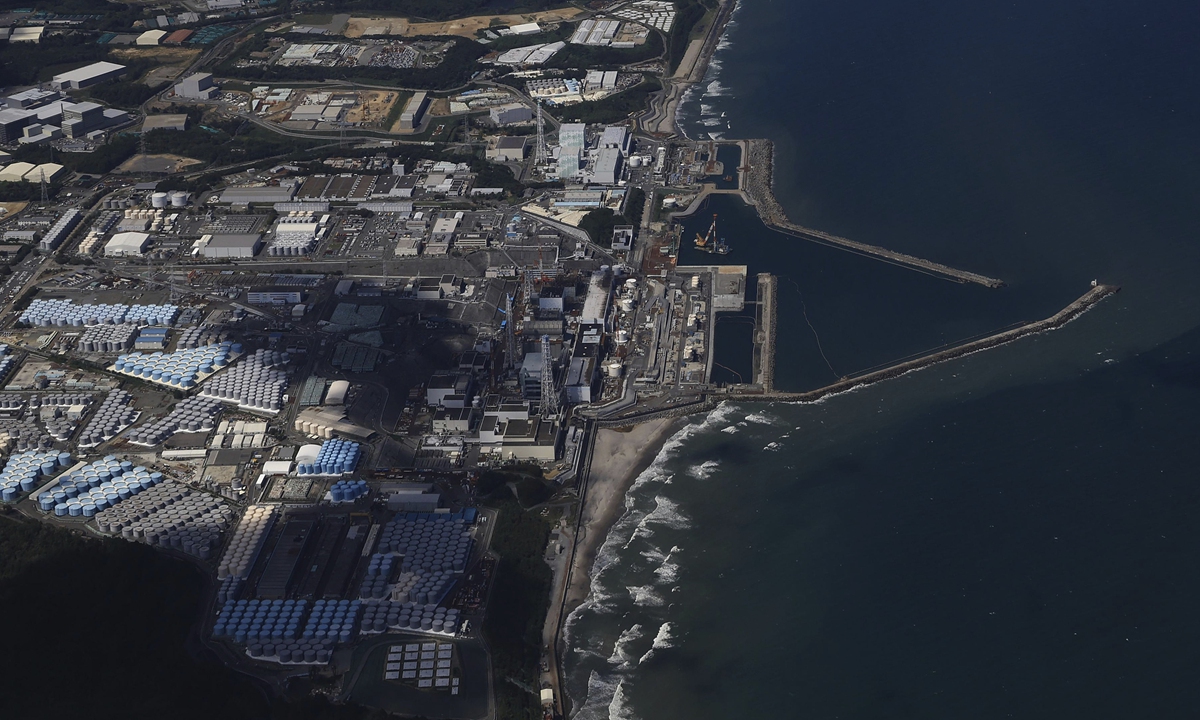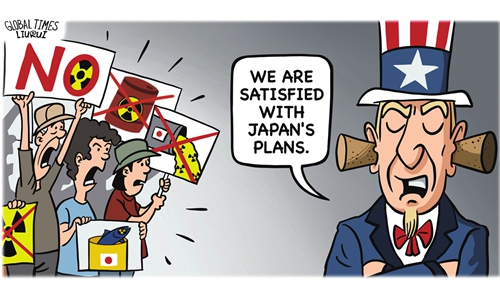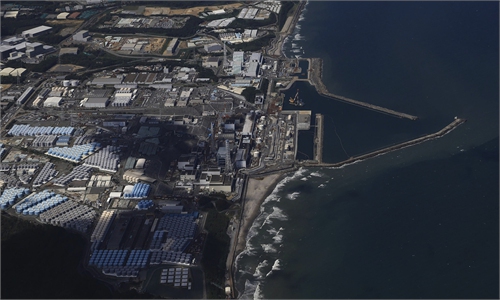Japan should reflect on international opposition to its selfish and irresponsible act: Chinese FM

Japan starts dumping nuclear-contaminated wastewater into the ocean. Photo:VCG
China has always protected the safety and legitimate rights and interests of foreigners in China in accordance with the law, and China strongly urges the Japanese side to immediately cease the dumping of nuclear-contaminated wastewater into the ocean, while the Japan should reflect on the international opposition to its selfish and irresponsible act, the Chinese Foreign Ministry said on Monday.
Foreign Ministry spokesperson Wang Wenbin made the remarks during a regular press conference on Monday in response to a journalist's question about the incidents of "throwing stones and eggs" targeting Japanese schools in China.
The Japanese government has disregarded strong questioning and opposition from the international community and unilaterally initiated the dumping. Surrounding countries and the broader international community widely criticize the Japanese government for its selfish and irresponsible behavior, and have taken corresponding preventive measures, Wang noted.
Wang said that a spokesperson from the North Korean Ministry of Foreign Affairs stated that the Japanese side, disregarding strong protests, opposition and warnings from both domestic and international communities, is persistently implementing the plan to dump nuclear-contaminated wastewater into the ocean, which is a selfish act aimed at personal gain and a inhumane criminal act that is to cause nuclear disasters for humanity.
Prime Minister of Solomon Islands said that he strongly opposes Japan's decision to dump nuclear-contaminated wastewater into the ocean, as it will have a significant impact on the marine environment, economy and livelihood of the Solomon Islands people.
Vanuatu's Deputy Prime Minister and Minister of Foreign Affairs called for a boycott over Japan's actions. Ministry of Natural Resources and the Environment of the Russian Federation stated that Japan's dumping will compel regional countries to expand the scale and intensity of monitoring of marine environmental and biological radiation, Wang added.
The Prime Minister of South Korea said that if it is found that Japan's dumping of nuclear-contaminated water into the ocean does not meet concentration standards for radioactive elements, South Korea will immediately demand Japan to stop the dumping and initiate international litigation. South Korea will also maintain the import ban on water products from eight prefectures including Fukushima, Wang said.
Wang noted that the Democratic Party of Korea has pointed out that dumping nuclear-contaminated wastewater into the ocean is an act of environmental terrorism. The Federal Environmental Minister of Germany said that they strongly criticize any behavior that releases additional radioactive substances into the ocean, and the option of discharging into the sea should only be considered as a last resort after exhausting all other means. It must be based on scientific grounds and implemented with transparency.
Additionally, the Director-General of the Malaysian Ministry of Health said that they will elevate the food risk inspection levels for imported Japanese food. The Thai Food and Drug Administration announced that they will strengthen the inspection of imported seafood from Japan, with the sample size for random checks doubled, Wang added.
Wang said that after Japan's dumping of nuclear-contaminated wastewater into the ocean, opposition within Japan has also intensified. The Democratic Party of Japan expressed concerns about the government's violation of its commitment to proceed with the discharge. The Social Democratic Party of Japan said that discharging nuclear-contaminated water into the sea is an act of violence and the deliberate dispersal of radioactive substances into the ocean is unforgivable.
The National Federation of Fisheries Cooperative Associations of Japan and the fisheries cooperatives of Miyagi jointly issued a statement, saying that their opposition to the discharge has not changed at all. Groups representing victims of the Hiroshima nuclear explosion held a rally, calling for the cessation of the discharge, Wang noted.
According to a Japanese opinion poll, approximately 40 percent of respondents are against Japan's action, while 88.1 percent of the respondents expressed concern that the discharge plan would damage Japan's image and potential economic interests. A total of 81.9 percent of the respondents believe that the explanation provided by the Japanese government is insufficient, said Wang.
Even the US, which claims to be satisfied with Japan's plan to dump nuclear-contaminated wastewater into the ocean, has reportedly reduced its imports of agricultural and aquatic products from Japan in the first half of this year, Wang said. "I think everyone can go and ask the US side what exactly they are worried about," he said.
Wang stressed that China strongly urges the Japanese side to take into account the legitimate concerns of all parties, immediately cease the dumping, fully consult with neighboring countries and other relevant stakeholders and responsibly handle the issue.
In response to the concerns expressed by the public about the marine environment and the safety of seafood, Wang stated that China has continuously conveyed a stern position to Japan through diplomatic channels, demanding that Japan stop the forced discharge plan.
The Chinese governments have taken measures to monitor the marine radiation environment and the risk of nuclear contamination in marine products to ensure the health and safety of the Chinese people, said Wang.
In response to concerns among Japanese people in China that anti-Japanese actions have become more frequent and public, Wang said that China has always safeguarded the safety and legitimate rights and interests of foreigners in China in accordance with the law.
Japanese Vice-Minister for Foreign Affairs Masataka Okano met with Ambassador Wu Jianghao of China on Monday afternoon, according to the Chinese Embassy in Japan.
Wu reiterated China's stance on the issue of Fukushima nuclear-contaminated wastewater being discharged into the sea, emphasizing that the Japanese side's discharge poses enormous risks and unpredictable harm to the global marine environment and the health and safety of all mankind, and has caused strong indignation from the international community, including China.
The Japanese discharge has serious moral, scientific, and legal problems, and this erroneous behavior should be immediately stopped. Japan should honestly communicate with neighboring countries with a truly responsible attitude, accept strict supervision from the international community, and effectively dispose of the nuclear-contaminated water in a scientific, safe and transparent manner, said Wu.
Additionally, Wu made solemn representations regarding the harassment suffered by the Chinese Embassy and Consulates in Japan, stating that the Chinese diplomatic missions in Japan have recently received a large number of harassing phone calls from within Japan, seriously disrupting their normal operations.
China urges Japan to handle this matter in accordance with the law and effectively ensure the safety of Chinese diplomatic premises, personnel, as well as the safety of Chinese institutions, enterprises, citizens and Chinese tourists in Japan, Wu noted.
Wu said that China will continue to legally guarantee the security of the Japanese Embassy and Consulates in China and the legitimate rights and interests of Japanese citizens in China.
Global Times



